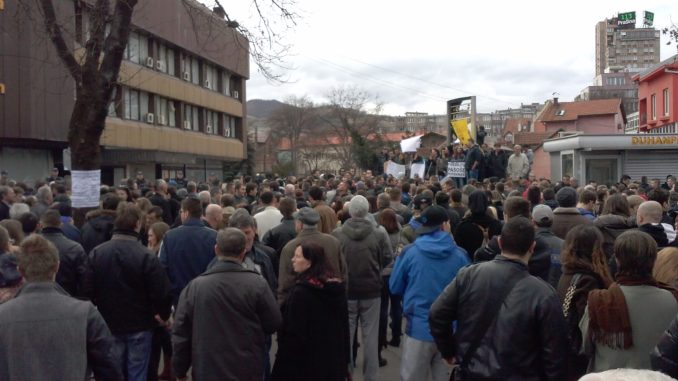
Months after a wave of protests had Bosnia’s political establishment running scared, the energy has faded away, leaving some wondering what legacy – if any – the movement has left behind.
As if they had woken from a years-long sleep, this February, thousands of citizens of Bosnia and Herzegovina took to the streets to say they had had enough of the country’s incompetent and hypocritical politicians, their corruption and their dubious accumulation of much personal wealth.
The Molotov cocktails that some of them threw were a strongly worded “message in a bottle” to the political class – a forceful rejection of the prevailing view in Bosnia that politics exists chiefly as money-making business – not as a way to improve ordinary people’s lives.
Months on, what has really changed? Aside from the resignations of a few cantonal governments – almost irrelevant to the overall situation – none of the protesters’ demands has been met.
No major corruption cases have been opened, nor is there any sign of a review of the dodgy privatization processes that destroyed so many companies and left thousands of people jobless.
Nothing much has changed in the way that Bosnia’s politicians use the media, or in the way that they operate in the two entities, which is where the real power and money in Bosnia lie.
Started by several hundreds workers of formerly successful, now destroyed, companies in Tuzla, the protests soon attracted thousands of others all over the country.
It seemed as if people had been only waiting for an opportunity to go onto the streets and declare that the authorities were all thieves.
But, the expectations of significant change lasted only for a few days.
Esad Bajtal, an analyst and professor, recently said in an interview that it was hard to say what concrete changes people had achieved, although they had opened the door to future possibilities.
“For the first time, citizens came out as citizens, for the first time a rebellion had no national, ethnic or faith-based framework, and for the first time the participants spoke using human rhetoric,” he said. “For now, that would seem to be the only known, tangible gain of those events.”
Bajtal argued that the protests were entirely justified, as the politicians had not listened to people, even when they held peaceful protests before the February events, when they demonstrated their deep dissatisfaction without resorting to violence.
“It should be determined how and why it came to violence and who needed it, because this was automatically constituted as a basic element in the politicians’ self-defence – which declared the protesters hooligans, ruffians and gangs even drug addicts,” he said.
Adnan Hamidovic Frenkie, a popular hip-hop musician from Tuzla, said that as time goes by, one has to conclude that the people lost this particular battle.
“From this distance, I don’t think we achieved much,” he said. “With the government – it’s like in a casino – the house wins always at the end of the day.”
“We won the first round,” he added, referring to the beginning of the protests, “But then came other [rounds] and now we lost. We have seen that we can do something, but also that nothing can be changed overnight.”
Plenums work – but who listens?
As the protests spread from Tuzla in early February, so did the formation of so-called plenums of citizens, which aimed to bring all people together to voice their common demands for change.
With the goal of forcing out the politicians and bringing social and economic issues to the forefront, plenums promised to be places where democracy was practiced first hand.
With the passage of time, it may become clearer what went wrong with plenums and why they failed to attract those same thousands of protesters.
Roughly a hundred people were present at the last session of the Sarajevo plenum, and only few hundred took part in the “plenum of all plenums”, which was held in front of the Federation entity government and demanded its resignation.
While waiting for the Federation government to resign, which is now highly unlikely, or for the formation of new cantonal governments, the interest of citizens in plenums has flagged.
There are 15 plenums currently active in different towns in Bosnia’s Federation entity. Thousands of demands have been sent to municipal, cantonal and entity institutions.
But, with only a small number of supporters and participants, plenums do not look like tools for real change, especially as they now seem focused on the cantonal level of government, which at the end of the day cannot address the years-long problems the whole country suffers from.
“Important changes in this country are possible only as a consequence of constitutional changes at the top, regarding the whole of Bosnia and Herzegovina and the highest state structures,” Bajtal said.
Compared to that, changes at the cantonal level have been compared by some to putting perfume on top of a garbage dump.
The first successes, when people bared angry teeth and alarmed the politicians, seemed to push people to do more, but “more” never happened.
Tuzla Canton is the only one that has moved forward, following the February resignation of the cantonal government. A new “expert” government has been formed there.
In some other cantons there have been a few changes, such as abolishing the rights of politicians to continue receiving salaries for a year after their terms end.
While a few dozen determined people still protest every day in Sarajevo and elsewhere, the plenums keep working away, adding to their lists of demands.
In Sarajevo Canton, however, there is no sign of a new government that would be in any position to implement them, even if it wanted to.
One problem with the protest movement is that it lacked a leader and an ideology.
The result was dozens of different demands, ranging from reviews of privatization processes to curbing corruption and enacting constitutional changes, changing the 1995 Dayton Peace Accords.
Since many of the demands were so general, many of the politicians did not feel any particular responsibility for dealing with them, but just used them to continue their usual practice of accusing one another.
“No social movement in European history ever succeeded on the basis of liberal anarchism,” Ivo Komsic, philosophy professor and Mayor of Sarajevo, observed recently.
“Such movements fall apart because they cannot systematize all social demands nor can they direct the methods of their activism,” he added.
“The current governments will surely draw lessons from this insurgency, but it is just as important that lessons be learned by the citizens as well,” he concluded.
By Elvira M. Jukic
(BIRN, Sarajevo)



